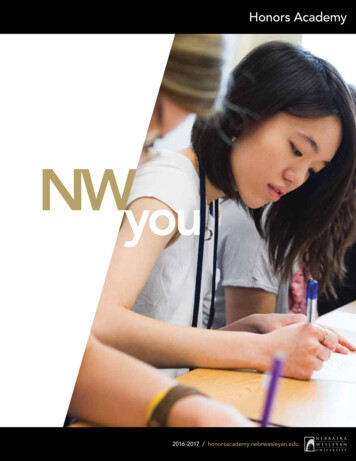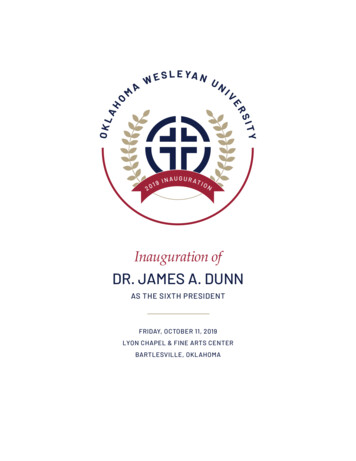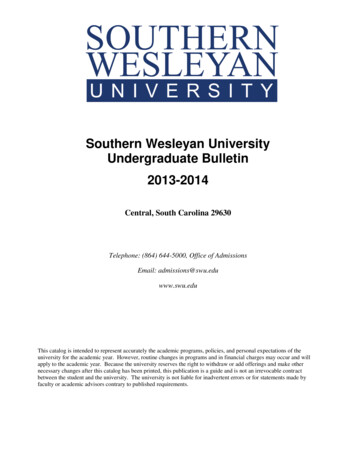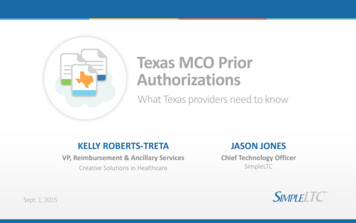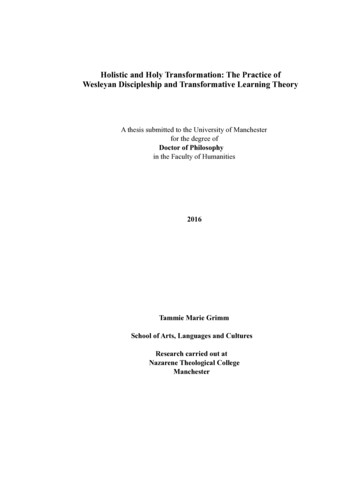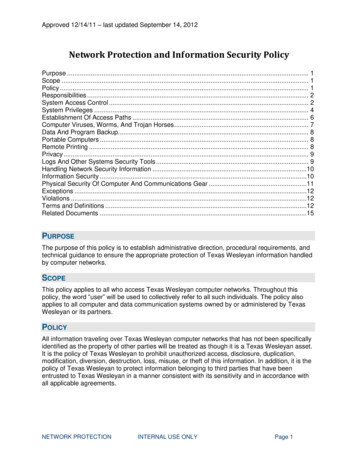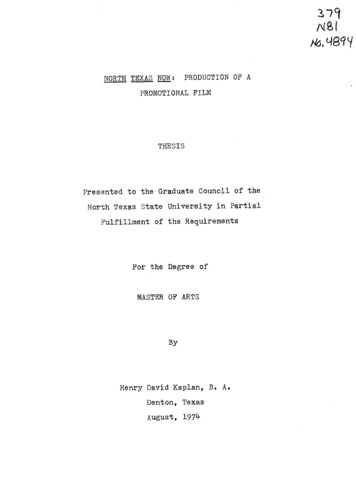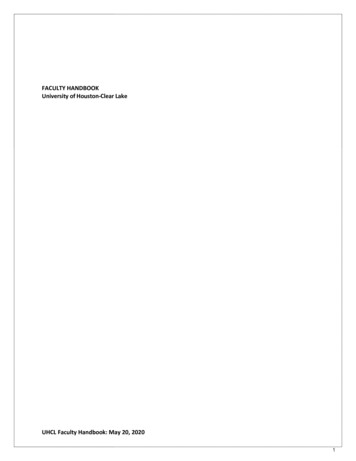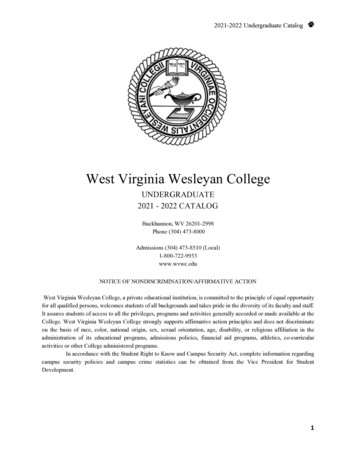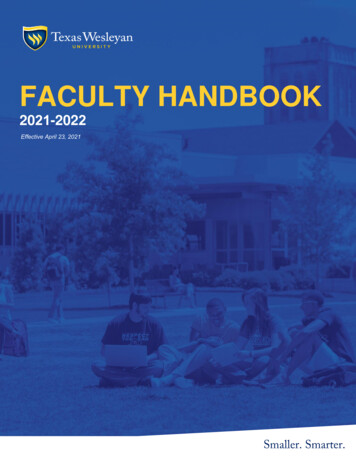
Transcription
FACULTY HANDBOOK2021-2022Effective April 23, 2021
TABLE OF CONTENTSSECTION 1: UNIVERSITY MISSION STATEMENT . 1SECTION 2: INTRODUCTION . 1SECTION 3: EQUAL OPPORTUNITY . 1SECTION 4: ORGANIZATION OF THE UNIVERSITY . 24.1 ADMINISTRATIVE ORGANIZATION .24.2 PRESIDENT AND EXECUTIVE AND SENIOR STAFF .24.3 PROVOST/SENIOR VICE PRESIDENT .24.4 VICE PRESIDENT FOR ADMINISTRATION AND FINANCE .24.5 VICE PRESIDENT FOR STUDENT AFFAIRS (VPSA)/DEAN OF STUDENTS .24.6 VICE PRESIDENT FOR UNIVERSITY ADVANCEMENT .34.7 VICE PRESIDENT FOR ENROLLMENT, MARKETING AND COMMUNICATIONS.34.8 ACADEMIC DEANS .34.9 LIBRARY DIRECTOR: THE EUNICE AND JAMES L. WEST LIBRARY .34.10 CHIEF OF STAFF AND GENERAL COUNSEL TO THE PRESIDENT .34.11 OTHER DIRECTORS .34.12 ADMINISTRATIVE SEARCHES .4SECTION 5: ADMINISTRATIVE POLICIES RELATING TO FACULTY. 45.1 FACULTY RESPONSIBILITY .45.2 FREEDOM FROM HARASSMENT AND DISCRIMINATION POLICIES .55.3 DRUG AND SMOKE-FREE ENVIRONMENT.55.4 STUDENTS WITH DISABILITIES AND NON-DISCRIMINATION ON THE BASIS OF GENDER .65.5 APPOINTMENTS CONTRACTS .65.6 SALARY CHECKS AND INCREASES.65.7 COMMUNICATION CHANNELS .65.8 PUBLIC RELATIONS .75.9 ADVISORS FOR STUDENT ACTIVITIES OR ORGANIZATIONS .75.10 ACADEMIC FREEDOM .75.11 INTELLECTUAL PROPERTY.85.12 THE FACULTY PERFORMANCE APPRAISAL .85.13 TENURE: FUNDAMENTAL CONCEPT; ELIGIBILITY; PRIOR SERVICE CREDIT .85.14 TENURE PROCESS.95.15 APPEALS PROCEDURE REGARDING ADVERSE TENURE DECISIONS . 135.16 PROMOTION POLICY. 155.17 FACULTY/ACADEMIC STAFF GUIDELINES . 185.18 FACULTY TEACHING OVERLOAD . 225.19 TWELVE-MONTH FACULTY GUIDELINES. 245.20 TERMINATION OF EMPLOYMENT OF A FULL-TIME FACULTY MEMBER . 265.21 FACULTY GRIEVANCE PROCEDURE-FILING A GRIEVANCE . 28
5.22 FACULTY SEARCHES . 30SECTION 6: BENEFITS AND PRIVILEGES . 306.1 FACULTY SABBATICALS . 306.2 OTHER LEAVES . 326.3 MEDICAL AND LIFE INSURANCE . 336.4 FACULTY DISABILITY POLICY . 336.5 SOCIAL SECURITY . 346.6 CAMPUS SECURITY . 346.7 RETIREMENT 346.8 EDUCATIONAL ASSISTANCE: TUITION WAIVER POLICY . 346.9 FACULTY EMERITI . 346.10 ENDOWED PROFESSORSHIPS . 35SECTION 7: FACULTY STANDING COMMITTEES . 357.1 COMMITTEE ON ACADEMIC AFFAIRS . 367.2 COMMITTEE ON ADMISSIONS, SCHOLARSHIP, AND FINANCIAL AID . 367.3 COMMITTEE ON ATHLETICS . 377.4 COMMITTEE ON ADVANCEMENT AND ALUMNI AFFAIRS . 377.5 BLUE GREEN GOLD COMMITTEE . 377.6 COMMITTEE ON FACULTY BENEFITS, PROFESSIONAL DEVELOPMENT, AND GRIEVANCES . 387.7 COMMITTEE ON FACULTY RECOGNITION AND HONORARY DEGREES . 387.8 COMMITTEE ON GENERAL EDUCATION CURRICULUM (GEC) . 397.9 COMMITTEE ON GRADUATE PROGRAMS . 397.10 COMMITTEE ON HONORS PROGRAMS . 407.11 COMMITTEE ON INTERNATIONAL EDUCATION. 407.12 COMMITTEE ON HEALTH BENEFITS . 407.13 COMMITTEE ON STUDENT AFFAIRS . 417.14 COMMITTEE ON STUDENT PUBLICATIONS . 417.15 COMMITTEE ON TEACHER EDUCATION . 417.16 COMMITTEE ON TENURE, PROMOTION, AND ACADEMIC FREEDOM . 427.17 COMMITTEE ON UNIVERSITY COLLEGE DAY . 427.18 UNIVERSITY JUDICIAL BOARD . 427.19 COMMITTEE ON UNIVERSITY PLANNING . 437.20 FACULTY ADVISORY COMMITTEE TO THE CENTER FOR EXCELLENCE IN TEACHING AND LEARNING . 447.21 BOARD OF TRUSTEES STANDING COMMITTEES. 44SECTION: 8: CHANGES TO THE FACULTY HANDBOOK . 44SECTION 9: CONSTITUTION AND BY-LAWS OF THE FACULTY ASSEMBLY . 45APPENDIX. . 48
4
FACULTY HANDBOOK 2021-2022SECTION 1: UNIVERSITY MISSION STATEMENTTexas Wesleyan University, guided by its deep Methodist heritage, also provides transformational learning experiencesand research opportunities to a diverse group of students to develop their full potential as individuals and as membersof the world community.The university’s faculty and staff engage in scholarship and research that inform teaching and advance knowledge andunderstanding, as well as innovative teaching skills and delivery modalities to afford each student with individualattention to develop critical thinking, analytical reasoning and creative problem-solving skills through a smallcommunity approach that allows tailored student experiences in and outside the classroom.With a belief that a liberal arts and sciences education develops the mental agility and social awareness to elevatesocioeconomic mobility, the university’s faculty and staff are dedicated to facilitating success among students from allbackgrounds in all levels of undergraduate, graduate, and professional programs in persisting to college degrees thatenhance their own lives, the lives of their families, and the strength of their communities.SECTION 2: INTRODUCTIONThis Faculty Handbook is designed to provide the faculty of Texas Wesleyan University with basic information concerningsubjects relating to the role of the faculty within the University. Each faculty member of the University should becomefamiliar with the responsibilities, opportunities, and obligations set forth in this Handbook. For those policies andprocedures not covered in this Handbook, the faculty member is advised to consult the policy and procedure manual fortheir school and to consult the Faculty Guide. The Faculty Handbook was developed in accord with the policies andprocedures of the Board of Trustees of Texas Wesleyan University. The Faculty Handbook shall be reviewed by the FacultyCouncil and Academic Affairs and the Student Life Committee of the Board at least every five years.For all policies and procedures not covered in this Handbook or in other university policy and procedure manuals,including those of the Board of Trustees, the University and the Board may consult the American Association of UniversityProfessors (AAUP) Policy Documents and Reports (current edition) and other higher education professional resources todevelop new university policy.Change in Board policy may affect specific provisions of this Handbook, and Board policy serves as the guide to all otherpolicies and procedures of the University.The authority to establish or amend University policy rests solely with the Board of Trustees.SECTION 3: EQUAL OPPORTUNITYTexas Wesleyan University is an equal opportunity employer.The University upholds its commitment to provide equal opportunity to all employees and applicants for employment inall phases of employment, including, but not limited to, recruiting, hiring, placement, compensation, benefits, promotion,demotion, discipline, transfer, and termination. The University shall not discriminate in the employment context againstany individual because of race, color, religion, creed, national or ethnic origin, gender, age, disability, veterans’ status,sexual orientation, or any other reason prohibited by applicable federal, state, or local laws.The University shall make reasonable accommodations for qualified individuals with known disabilities unless doing sowould result in an undue hardship for the University. This policy governs all aspects of employment, including selection,job assignment, compensation, discipline, termination, and access to benefits and training.Discrimination should be reported to the employee’s supervisor, appropriate divisional vice president, associate vicepresident for human resources immediately. If the employee’s complaint is not adequately addressed, the employeeshould follow the faculty or staff grievance policy.1
TEXAS WESLEYAN UNIVERSITYSECTION 4: ORGANIZATION OF THE UNIVERSITYThe governance of the University is vested in a Board of Trustees, as provided in its 1890 charter. The full Board ofTrustees meets in regular session (usually three times per year) and at such other times as may be needed. The Boardelects the President of the University, manages the property of the University, and determines general University policy.4.1 ADMINISTRATIVE ORGANIZATIONThe University has a line-and-staff organization. See the Appendix for the Organizational Chart and listing ofadministrative positions. The President has the authority to develop the organization necessary to carry out the activitiesof the University.4.2 PRESIDENT AND EXECUTIVE AND SENIOR STAFFThe President is the chief executive officer of the University and is directly responsible to the Board. The President isresponsible for overseeing all programs and operations of the University within the guidelines and the policiesestablished by the Board. The Provost, vice presidents, athletic director, and chief of staff/general counsel report directlyto the President and make up the executive staff. The Provost/ Senior Vice President, the vice presidents, the academicdeans, the associate provosts, associate vice presidents, the controller, the registrar, the chaplain, the faculty chair, theathletic director, the director of campus safety and security, the Executive Director of Facilities and the Presidentcomprise the membership of the Senior Staff, which meets regularly to consider the policies and administration of theUniversity. In the absence of the President, the Provost/Senior Vice President presides at University meetings andfunctions. The composition of senior staff may be changed at the discretion of the President.4.3 PROVOST/SENIOR VICE PRESIDENTThe Provost/Senior Vice President directs the overall academic program of the University. Responsibilities of the positioninclude overseeing university academic planning, curriculum, faculty, library, and academic life of the University anddirecting the academic programs and support services of the four schools, Arts and Sciences, Business Administration,Education, and Health Professions through the academic deans. The associate provosts, deans of the schools, and thedirectors of Institutional Research, Center for Excellence in Teaching and Learning and the West Library report to theProvost/Senior Vice President.4.4 VICE PRESIDENT FOR ADMINISTRATION AND FINANCEThe Vice President for Finance and Administration is responsible for university-wide budgeting, accounting, auditing,purchasing, plant and facilities operation, risk management, information technology, student financial services, andhuman resources. Reporting to the Vice President for Finance and Administration are the Controller, Executive Directorof Facilities Development Operations, Risk Manager, Associate Vice President for Financial Services and the AssociateVice President of Human Resources and Title IX Coordinator.4.5 VICE PRESIDENT FOR STUDENT AFFAIRS (VPSA)/DEAN OF STUDENTSThe Vice President for Student Affairs (VPSA)/Dean of Students is the chief student affairs officer, reporting directly tothe President and serving as a member of the President’s Executive staff. The VPSA is responsible for providingexecutive-level leadership and vision for the Division of Student Affairs. The VPSA works collaboratively with othermembers of the senior leadership team to foster a climate focused on student success, service excellence, and datainformed decisions in alignment with the mission, vision, and goals of Texas Wesleyan University. The Division of StudentAffairs includes the functional areas of campus security, career services, student diversity & inclusion initiatives, thefitness center, Greek life, health services, housing & residence life, intramural sports, student leadership &volunteerism, multicultural programming, orientation & new student experiences, student conduct & civility, studentengagement, student organizations, and transition programming.2
FACULTY HANDBOOK 2021-20224.6 VICE PRESIDENT FOR UNIVERSITY ADVANCEMENTThe Vice President for University Advancement is responsible for University development, institutional advancement,and alumni activities. The Vice President coordinates the accrual of financial and other resources supporting the variousprograms of the University and directs the Annual Fund Drive, which raises funds for the general operating budget,scholarship, and endowment programs of the University. This office maintains relationships with communityorganizations and businesses.4.7 VICE PRESIDENT FOR ENROLLMENT, MARKETING AND COMMUNICATIONSServing as the university’s chief enrollment, marketing and communications officer, the Vice President acts as a strategicand practical advisor to the President, executive staff and the Board of Trustees in the development and execution of theuniversity’s overall leadership, vision and management of the school’s enrollment, marketing & communication plans.Provides leadership for all aspects of the university's efforts to engage the public through admissions, recruitment,marketing, digital communications, media relations, social media, publications, and editorial strategies.4.8 ACADEMIC DEANSEach school—Arts and Sciences, Business Administration, Education, and Health Professions—has an academic dean whooversees and administers its academic programs. The dean’s responsibilities include teaching; overseeing classroominstruction; managing school planning and assessment process; administering the school’s budget; supervising theselection of new faculty and staff; evaluating faculty performance; formulating recommendations regarding tenure,promotion, and salary increases for faculty and those staff assigned to the school; encouraging innovative courseofferings; and representing the University in a public relations role in the community. Each dean serves on the Committeeon Academic Affairs, advises students, oversees degree plans, and evaluates proposed curriculum changes within theschool. The deans also serve on the Provost Council with the chairperson of the Faculty Council/Assembly in an advisorycapacity to the Provost/Senior Vice President.4.9 LIBRARY DIRECTOR: THE EUNICE AND JAMES L. WEST LIBRARYThe Director of the Eunice and James L. West Library supervises the overall operation of the West Library. Theseresponsibilities include preparing and overseeing the library budget; coordinating the acquisition, cataloging, and filingof library material; developing library policies; planning and assessment of library services; managing the security of librarymaterials; supervising the selection of new library faculty and staff; and conducting evaluations of library faculty andstaff. The Director of the West Library holds faculty status as a University Librarian. For matters involving library facultyand staff of the West Library, the Director serves as a dean and makes recommendations regarding tenure, promotion,and salary increases to the Provost/Senior Vice President.4.10 CHIEF OF STAFF AND GENERAL COUNSEL TO THE PRESIDENTResponsible for the management and operations of the office of the president and its staff. Works closely with seniorUniversity administrators and their staff to address issues, assists with key initiatives, and facilitates communication withthe president and the Board of Trustees. Chief of Staff coordinates the president’s role in multi-jurisdictional meetings,events, and initiatives within the University. As the University’s General Counsel, responsibilities include providing legaladvice regarding work-related legal matters and inquiries, legal matters involving outside agencies or individuals andserves as the University’s primary liaison with retained outside legal counsel.4.11 OTHER DIRECTORSOther director positions may, from time to time, be created to assist the vice presidents. These appointments are staffappointments and do not carry faculty status or rank. Directors are appointed in keeping with University personnelguidelines. The directors serve on advisory councils as appropriate to senior staff.3
TEXAS WESLEYAN UNIVERSITY4.12 ADMINISTRATIVE SEARCHESThe guidelines for hiring vice presidents and academic deans (those positions specifically noted in sections 4.3–4.9) areanalogous to the guidelines for hiring tenure-track faculty. The President appoints a search committee withrecommendations regarding faculty representation as received from the chair of the Faculty Council/Assembly. Thespecific composition of the committee and the number of representatives is determined by the President.The Equal Employment Opportunity Commission (EEOC) officer, or the individual who functions in such capacity, mustapprove search committee rosters. The search committee, once formed, shall, to the extent possible, conduct a nationalsearch and shall recommend to the appropriate vice president or to the President (for those positions that report directlyto the President) the finalists for the position. The President or designee, except in searches for the President, will makethe final decision.The Board of Trustees appoints the President. The Board of Trustees or the Executive Committee acting on behalf of theBoard determines the search process for the position of President. Open communication between appropriate facultyand staff is expected so that the individual selected for the position will meet the expectations of both faculty and staff.The search committee for the position of Provost shall have adequate faculty representation from each school, a currentdean (from any school), one administrative officer or administrative staff member other than a dean, and, if appropriate,one alumnus. Such committee will be formed by the faculty in consultation with the President; the committee rostermust be approved by the Faculty Council and the Equal Employment Opportunity Commission (EEOC) officer, or theindividual who functions in such capacity. The formal appointment of the committee is made by the President.The search committee for the position of dean shall be a minimum of three faculty members from the school in whichthe search is conducted, a former or current dean (from any school), one administrative officer or administrative staffmember other than a dean and, if appropriate, one alumnus. Such committee will be formed by the faculty inconsultation with the Provost/Senior Vice President; the committee roster must be approved by the Faculty Council andthe Equal Employment Opportunity Commission (EEOC) officer, or the individual who functions in such capacity. Theformal appointment of the committee is made by the Provost/Senior Vice President with the approval of the President.Search committees for other administrative positions, including those such as, but not limited to, associate or assistantvice president to director positions, will be appointed by the senior officer to which the individual reports and shouldinclude representation from appropriate faculty and staff. Such committee rosters must be approved by the FacultyCouncil and by the President.SECTION 5: ADMINISTRATIVE POLICIES RELATING TO FACULTY5.1 FACULTY RESPONSIBILITYProfessional educators are responsible to their students, to their disciplines, to their colleagues, and to themselves.Faculty members are charged to impart to students a knowledge and understanding of their disciplines, to challengestudents to further exploration, to respect students as individuals, and to adhere to their proper roles as intellectualguides and counselors, avoiding any exploitation, harassment, or discriminatory treatment of students. Faculty membersowe dedication to seeking and stating the truth in their discipline as best practice dictates. Maintaining an effectiveworking relationship with other faculty members, staff, and students will in great measure determine how effective theeducational endeavor will be. Each faculty member should strive to achieve and maintain the highest possible level ofprofessional stature.Scholarly or creative activity deemed worthy of maintaining high levels of professional stature is eligible for reducingfaculty teaching load. Application for this reduction in teaching load will be approved or disapproved by the dean andthe Provost and communicated to the Department Chair.5.1.1 Inside the Classroom4
FACULTY HANDBOOK 2021-2022Teaching faculty members are expected to meet their classes at the time and place appointed and to begin and endclasses on time. Administrative and personal matters should not interfere with this primary responsibility. Facultymembers shall post and maintain reasonable office hours to be available for student advising. They shall also keepaccurate records of students’ attendance and grades. It is the policy of the University to maintain records from studentscompleting coursework, including specifics of how the course grades were earned, for a period of no less than one yearafter the completion of the course. Faculty members may be asked to teach some of the courses offered in the eveningsand weekends and via distance education. Each faculty member is expected to notify their dean (or department/divisionchair, if appropriate) and make appropriate arrangements if unable to meet a class.5.1.2 Outside the ClassroomFaculty duties include certain administrative and committee work. However, no faculty members will supervise studentwork for academic credit without compensation proportional to their contract. In addition to fulfilling classroomresponsibilities and conducting scholarly activities, full-time faculty are expected to hold office hours; advise students;fulfill assigned registration duties; participate in department/division, school, and University meetings; serve as necessaryon department/ division, school, and University committees; attend official academic University functions such asconvocations and graduations; represent the University in the community; and fulfill other responsibilities as assigned,.5.1.3 Conflict of InterestIt is to the mutual advantage of the University and the faculty for the services of faculty members with expertise in theirfield to be sought from outside the University. Faculty members may, with prior approval from their dean, performoutside work for pay during the months of regular, full-time employment. Such work shall not interfere with Universityduties. All such employment must be compatible, not competitive (such as working at another institution) with theUniversity’s interests and be of such a nature that it will not impair the usefulness of the faculty member as a teacherand scholar.5.2 FREEDOM FROM HARASSMENT AND DISCRIMINATION POLICIESHarassment and discrimination, including sexual harassment and discrimination, are illegal under federal and statestatutes, including, but not limited to, Title VII of the Civil Rights Act of 1964, Title IX of the Educational Amendments of1972, and the Texas Commission on Human Rights Act, and are prohibited at Texas Wesleyan University (the“University”). The University utilizes the Freedom from Harassment and Discrimination—Other Protected Characteristicsas well as the Title IX Policy to address, remedy, or resolve related matters.The University is committed to providing an environment of academic study and employment free from harassment ordiscrimination to all segments of its community, that is, its faculty, staff, students, guests, and vendors. It is theresponsibility of members of the University community to conduct themselves so that their words or actions cannot bereasonably perceived as harassing, discriminatory, sexually coercive, abusive, or exploitive or as interfering with anyother individual’s ability to study or work productively at the University.Furthermore, the University strictly forbids retaliation by any member of the University community against a participantor supporter of an individual exercising rights outlined in the two policies. Full policies and procedures are contained inthe Employee Handbook.For the Title IX Coordinator’s contact information or the report form, please see the Title IX Prevention and Responsepage.5.3 DRUG AND SMOKE-FREE ENVIRONMENTThe University maintains a drug-free workplace. Faculty members should recognize the hazards to themselves, to otheremployees, and to students while working under the influence of drugs or other intoxicants. In order to maintain a drugfree workplace, the unlawful manufacture, distribution, dispensation, possession, or use of a controlled substance by an5
TEXAS WESLEYAN UNIVERSITYemployee is prohibited while within the bounds of the University campus or while conducting University activities.All faculty members as a condition of their employment must at all times abide by the terms of this policy and must notifythe University of any C
Texas Wesleyan University is an equal opportunity employer. The University upholds its commitment to provide equal opportunity to all employees and applicants for employment in all phases of employment, including, but not limited to, recruiting, hiring, placement, compensation, benefits, promotion, demotion
